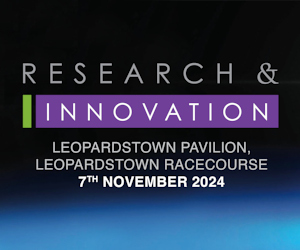Teachers and Nurses to Get Robotic Colleagues

A new Red C survey has found that 39% of adults in Ireland are concerned robots will take their jobs. The survey of 1,000 adults was conducted by Red C on behalf of Lero, the Science Foundation Ireland-funded software research centre. It found that 39% of respondents were worried that robots or artificial intelligence will take over their work.
Robots are already helping in classrooms and hospitals around the world and it is clear that our understanding of robotics needs to be explored further.
In response to this challenge, the Institute of Technology, Sligo is exploring how to educate the care, education and health workers of the future in how they might work with robotic colleagues. This will be the focus of an ambitious pan-European research and teaching project conducted by several universities and other partners across the continent, led by academics from the Institute.
Unlike most robots used in factories and warehouses, social robots are designed to interact directly with people. They are already being used to support staff in health and aged care centres and schools, as well as in shops, tourist spots and hotels across the world.
We often think of robots as cold, metallic functional machines incapable of human interaction. But some of the robots used in health and social care can be surprisingly cute and cuddly, a far cry from the B-Movie depiction of the 1950s.
Forget C3PO and think more Ewok in Star Wars terms. The Alzheimers Society is currently using a soft doe-eyed robot seal called ‘Paro’ that reacts to petting and conversation. Such technologies can be a real comfort to people with Alzheimer’s or autism or even those experiencing loneliness or depression.
As well as proving stimulation and companionship, robots in healthcare and education may assist workers in repetitive tasks that can often lead workers to feel stressed or even angry. A robot has infinite patience and can perform the same task repeatedly without getting frustrated.
Researchers are now trying to find ways to create a working environment where both humans and robots can work side-by-side. According to Dr John Pender, Futurist and Senior Lecturer in Politics & Social Policy at IT Sligo:
“It’s not a question of if, it’s a question of when. Increasingly, carers will be assisted by robots and Artificial Intelligence. There is growing evidence that the emotional intelligence possessed by social robots in the future will enable them to make a real difference to the lives of vulnerable people in society.”
We are already using AI-based ‘Chatbots’ and virtual assistants such as iPhone’s Siri. The technology is already here, but educating people to work with robots and AI is the hard part. The LERO/Red C survey shows that people are sharply divided in their attitudes to this new technological world.
The project
Dr Pender and colleague Dr Perry Share at IT Sligo will lead a strategic educational partnership called PRoSPEro (Pedagogy of Robotics in the Social Professions in Europe) over the next three years. The project team is drawn from seven universities and organisations across Europe and combines a broad span of expertise in robotics research, social care, social service delivery and pedagogy. The partners are: Universiteit Twente (Netherlands), Via University College (Denmark), University De Valencia (Spain), Holstebro Municipality (Denmark), NUI Galway and the University of Lower Silesia (Poland).
The Alzheimer Society of Ireland (ASI) is also involved with the project and will provide an opportunity to work on a ‘real case study’:
“There have been significant developments in social robotics in the care sector: in particular, in elder care and the care of people with dementia, as well as in the care and education of children and young people, especially those with specific disabling conditions such as autism,” says Dr Perry Share from IT Sligo.
The robotic baby seal ‘Paro’ – used by the ASI – is one such example. It is a therapeutic companion with basic Artificial Intelligence (AI), and has proven to be effective in the care of people with dementia and children with autism. It is widely used in care settings in Denmark and Australia, and is now here in Ireland.
The project will span three years, starting this September. It is has received financial backing of €344,110 from the EU Commission’s ‘Erasmus+ Strategic Partnerships’ programme. Gerry O’Sullivan, of the Higher Education Authority – Ireland’s Erasmus+ National Agency – congratulated IT Sligo in securing the funding:
“The success of IT Sligo in securing competitive funding under the Erasmus+ Programme will not only lead to enhanced knowledge and expertise in an area of critical need but is a tangible example of how higher education benefits citizens. The approach of the Institute also demonstrates its willingness to draw from and contribute to the knowledge base in Europe with partners from five other EU member states as well as NUI Galway involved in the project. International collaborations of this type are essential to ensure that the Irish higher education sector maintains and enhances its capacity to deliver education and training relevant to our needs.”
The funds will enable the PRoSPEro team to conduct policy, ethics and regulatory research. Faced with the developments in the social robotics field, and the fundamental questions they raise, the partnership has identified a need to establish educational and CPD supports, as well as amendments to regulatory standards.
“Increasingly robots are being developed to interact with ordinary people in wider society, not just scientists in research labs or carefully constrained environments. As a result important questions about their design, capabilities and legal status are being raised,” says Dr John Pender.
PRoSPEro will tackle some key issues for those who help to develop the professionals of the future: How do educators work with robots? How can we accurately gauge the impact of robots in the classroom? How do learners interact with robots? What will it even mean to be a professional in this future technological world?
CAPTION:
Dr John Pender, President Dr. Brendan McCormack and Dr. Perry Share of IT Sligo with a robotic seal which helps sufferers of dementia reduce stress.







